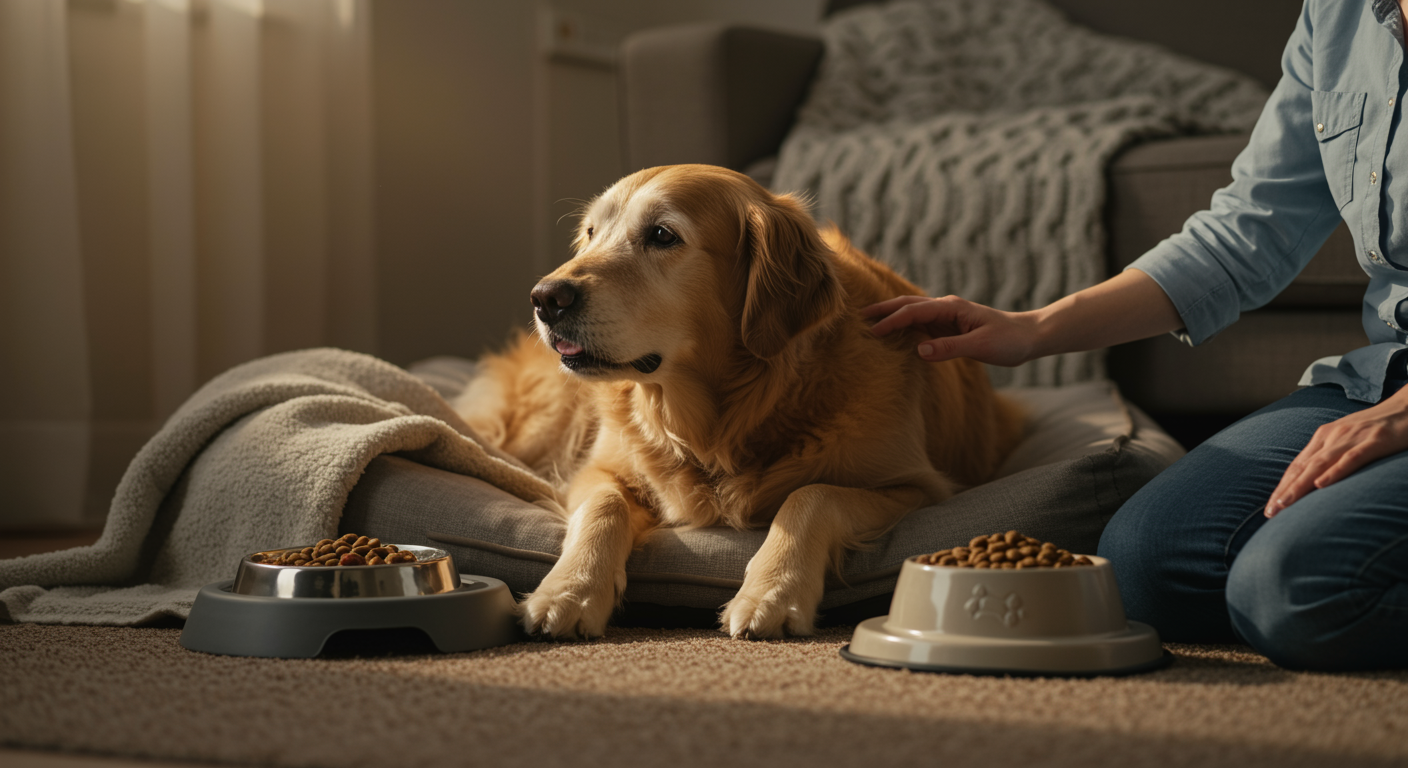Creating consistent daily comfort routines becomes essential as Golden Retrievers enter their senior years, providing structure, security, and enhanced quality of life during this important life stage. Well-designed comfort routines address the unique needs of aging dogs while supporting their physical well-being, emotional stability, and continued enjoyment of daily activities.
Senior Golden Retrievers thrive on predictable routines that accommodate their changing physical capabilities while maintaining mental stimulation and social connection. These routines should be flexible enough to adapt to varying energy levels and health needs while providing the consistency that helps senior dogs feel secure and comfortable.
Effective daily comfort routines encompass multiple aspects of care including rest and sleep optimization, gentle exercise and movement, nutrition timing, grooming and hygiene, and meaningful social interaction. When implemented thoughtfully, these routines can significantly improve the daily experience and overall happiness of senior Golden Retrievers.
Understanding Senior Comfort Needs
Physical Comfort Requirements
Joint Support and Mobility Comfort
Senior Golden Retrievers commonly experience joint stiffness and decreased mobility that affects their daily comfort levels. Morning stiffness may be particularly noticeable, requiring gentle warming activities and supportive measures to help them start their day comfortably.
Comfortable resting surfaces become increasingly important as joints become more sensitive to hard or uneven surfaces. Orthopedic bedding, cushioned mats, and elevated sleeping areas can provide significant relief from pressure points and joint discomfort.
Temperature regulation needs may change with age, as senior dogs often become more sensitive to cold and may seek warmer resting spots. Providing warm, draft-free sleeping areas and considering heated beds during colder months supports joint comfort and overall well-being.
Digestive Comfort Considerations
Digestive efficiency often decreases with age, making meal timing, portion sizes, and food consistency important factors in maintaining daily comfort. Senior dogs may benefit from smaller, more frequent meals that are easier to digest and less likely to cause discomfort.
Food temperature and texture preferences may change, with some senior dogs preferring slightly warmed food or softer textures that are easier to chew and swallow. Accommodating these preferences can significantly improve mealtime comfort and enjoyment.
Consistent meal timing helps regulate digestive processes and can prevent discomfort from hunger or overeating. Regular feeding schedules also support overall routine structure that senior dogs find comforting and predictable.
Emotional and Mental Comfort
Security and Routine Stability
Senior Golden Retrievers often find great comfort in predictable daily routines that provide security and reduce anxiety about unknown or changing circumstances. Consistent timing for meals, walks, and rest periods helps create a sense of stability.
Familiar environments and consistent caregiver presence contribute significantly to emotional comfort. Changes in routine or environment should be introduced gradually when necessary, allowing senior dogs time to adjust without stress.
Maintaining connection to favorite activities, even in modified forms, helps preserve emotional well-being and provides comfort through continued engagement with enjoyable experiences.
Social Interaction Needs
Social comfort remains important throughout the senior years, though the type and intensity of interaction may need adjustment based on energy levels and physical capabilities. Gentle, consistent interaction helps maintain emotional bonds and mental stimulation.
Understanding individual preferences for social interaction helps tailor routines to provide optimal comfort. Some senior dogs prefer quiet companionship, while others continue to enjoy more active social engagement.
Regular, predictable social interaction times help senior dogs anticipate and prepare for enjoyable experiences, contributing to overall emotional comfort and well-being.
Morning Comfort Routines
Gentle Wake-Up Procedures
Slow Transition from Sleep
Senior Golden Retrievers benefit from gradual wake-up routines that allow time for joints to warm up and stiffness to ease before beginning daily activities. Rushing into immediate activity can cause discomfort and set a difficult tone for the day.
Gentle stretching or light movement encouragement helps joints become more flexible and comfortable before walking or other activities. This might include encouraging natural stretching behaviors or providing gentle massage if the dog enjoys it.
Allowing extra time for morning routines reduces stress and pressure, enabling senior dogs to move at their own pace while still maintaining structure and predictability in their daily schedule.
Comfort Assessment and Adjustment
Daily morning assessment of comfort levels helps identify days when additional support or modified activities might be beneficial. Observing mobility, appetite, and general demeanor provides valuable information for tailoring the day’s routine.
Weather considerations become more important for senior dogs, who may need additional warmth or protection from cold morning temperatures that can increase joint stiffness and discomfort.
Flexibility in morning routines allows for adjustment based on individual needs while maintaining overall structure that provides security and predictability for senior dogs.
Morning Activity Preparation
Gentle Movement Initiation
Starting the day with gentle, low-impact movement helps improve circulation and joint mobility while avoiding strain or overexertion. Short walks or simple indoor movement can be effective for warming up aging joints.
Indoor stretching activities or encouraging natural behaviors like gentle play or exploration can provide beneficial movement without the challenges of outdoor conditions or longer activities.
Gradual activity buildup throughout the morning allows senior dogs to reach their optimal comfort and mobility levels naturally, setting a positive foundation for the rest of the day.
Daily Comfort Routines Schedule
| Time Period | Comfort Activities | Duration | Focus Areas | Adaptation Notes |
|---|---|---|---|---|
| Early Morning | Gentle wake-up, light stretching | 15-20 minutes | Joint mobility, circulation | Allow extra time on stiff days |
| Morning | Breakfast, short walk, grooming check | 30-45 minutes | Nutrition, movement, hygiene | Adjust walk length as needed |
| Mid-Morning | Rest period, mental stimulation | 60-90 minutes | Recovery, cognitive engagement | Quiet activities preferred |
| Afternoon | Social time, gentle play, comfort check | 30-60 minutes | Emotional connection, light activity | Match energy levels |
| Evening | Dinner, relaxation activities | 45-60 minutes | Nutrition, winding down | Consistent timing important |
| Bedtime | Comfort preparation, settling routine | 20-30 minutes | Sleep preparation, security | Create calm environment |
Nutrition and Feeding Comfort
Optimal Meal Timing and Presentation
Digestive Comfort Scheduling
Senior Golden Retrievers often benefit from smaller, more frequent meals that reduce digestive stress and maintain consistent energy levels throughout the day. Three smaller meals may be more comfortable than two larger ones for dogs with sensitive digestion.
Meal timing coordination with medication schedules, if applicable, ensures optimal absorption and effectiveness while maintaining comfort. Consistent timing helps regulate digestive processes and prevents discomfort from irregular eating patterns.
Pre-meal preparation time allows senior dogs to anticipate and prepare for eating, which can stimulate appetite and improve digestive readiness, contributing to overall mealtime comfort.
Food Presentation for Senior Comfort
Elevated feeding stations reduce neck and back strain during eating, making mealtime more comfortable for dogs with joint issues or mobility limitations. The appropriate height depends on the individual dog’s size and comfort preferences.
Food temperature and texture modifications can significantly improve eating comfort. Slightly warming food can enhance aroma and palatability while making it easier to chew and swallow for dogs with dental sensitivities.
Non-slip bowls and stable feeding areas prevent frustration and strain from chasing moving bowls or awkward positioning during eating, contributing to a more comfortable and enjoyable mealtime experience.
Hydration Comfort Support
Water Access Optimization
Multiple water sources throughout the home ensure that senior dogs with mobility limitations always have easy access to fresh water without needing to travel long distances or navigate obstacles.
Water temperature preferences may change with age, with some senior dogs preferring room temperature or slightly warm water over very cold water that might be uncomfortable for sensitive teeth or stomachs.
Elevated water bowls can improve drinking comfort for dogs with neck or back issues, while wide, shallow bowls may be easier for dogs with vision changes or mobility limitations to use comfortably.
Rest and Sleep Comfort Enhancement
Creating Optimal Resting Environments
Sleep Surface Optimization
Senior Golden Retrievers require supportive sleeping surfaces that cushion joints and provide pressure relief during extended rest periods. Memory foam or orthopedic bedding can significantly improve sleep comfort and quality.
Multiple comfortable resting options throughout the home allow senior dogs to choose locations based on temperature preferences, family proximity, and individual comfort needs throughout the day.
Easy-to-clean bedding materials maintain hygiene while providing comfort, particularly important for dogs who may experience occasional incontinence or require frequent position changes.
Environmental Comfort Controls
Temperature control becomes increasingly important for senior dog comfort, as aging dogs may have difficulty regulating body temperature effectively. Providing warm, draft-free sleeping areas supports comfortable rest.
Noise control and lighting considerations help create peaceful resting environments that support quality sleep. Senior dogs may be more sensitive to disturbances and benefit from quieter, darker rest areas.
Accessibility to resting areas without barriers such as stairs or high surfaces ensures that senior dogs can access comfort when needed without strain or difficulty.
Sleep Routine Establishment
Bedtime Comfort Preparation
Consistent bedtime routines help senior dogs prepare for sleep and feel secure during rest periods. These routines might include gentle brushing, comfortable positioning assistance, or quiet companionship time.
Evening comfort checks ensure that senior dogs are positioned comfortably and have access to water and elimination areas if needed during the night, reducing anxiety and promoting restful sleep.
Creating positive associations with sleep time through gentle interaction and comfortable preparation helps senior dogs look forward to rest periods and settle more easily.
Movement and Exercise Comfort
Low-Impact Activity Integration
Gentle Exercise Routines
Daily movement remains important for senior Golden Retrievers, but activities should be modified to accommodate changing capabilities while maintaining the benefits of regular exercise for joint mobility and overall health.
Short, frequent walks may be more comfortable than longer sessions, allowing for rest breaks and preventing overexertion while still providing beneficial movement and mental stimulation.
Indoor exercise options provide alternatives for days when weather or other factors make outdoor activity uncomfortable, ensuring consistent movement opportunities regardless of circumstances.
Activity Adaptation Strategies
Recognizing daily variations in comfort and energy levels allows for appropriate activity adjustments that maintain movement benefits while respecting physical limitations and comfort needs.
Surface considerations become important for senior dogs, with softer surfaces like grass or carpet being more comfortable for joints than hard pavement or concrete during exercise activities.
Pace adjustments that match the dog’s natural rhythm and comfort level ensure that exercise remains enjoyable and beneficial rather than stressful or uncomfortable.
Mental Stimulation Integration
Cognitive Comfort Activities
Mental stimulation activities should be adapted to senior capabilities while providing engaging experiences that support cognitive health and emotional well-being without causing stress or frustration.
Food puzzles and interactive toys designed for senior dogs provide mental engagement while accommodating potential vision or mobility changes that might affect interaction with traditional puzzle toys.
Training sessions using positive reinforcement can provide mental stimulation while reinforcing the human-animal bond, contributing to both cognitive health and emotional comfort.
Grooming and Hygiene Comfort
Daily Comfort Grooming
Gentle Grooming Approaches
Daily grooming routines should be adapted to accommodate senior dogs’ potential sensitivity and mobility limitations while maintaining hygiene and comfort. Shorter, more frequent sessions may be preferable to lengthy grooming periods.
Soft brushes and gentle techniques prevent skin irritation while providing the benefits of regular grooming including improved circulation, coat health, and bonding opportunities.
Positive associations with grooming through treats, praise, and gentle handling help maintain cooperation and make grooming a comfortable, enjoyable experience rather than a stressful obligation.
Hygiene Maintenance
Daily hygiene checks allow for early identification of issues that might affect comfort, such as matted fur, skin irritation, or areas needing special attention due to mobility limitations.
Spot cleaning as needed helps maintain cleanliness and comfort between formal bathing sessions, particularly important for senior dogs who may have difficulty maintaining their own hygiene.
Comfortable positioning during grooming procedures, such as allowing the dog to lie down or providing non-slip surfaces, reduces stress and strain while maintaining necessary hygiene care.
Social Interaction and Bonding
Daily Connection Routines
Quality Time Integration
Incorporating meaningful social interaction throughout daily routines helps maintain emotional bonds while providing comfort through human connection and attention.
Quiet companionship activities such as gentle petting, talking softly, or simply being present can provide significant comfort for senior dogs who may prefer less active interaction.
Recognizing individual preferences for social interaction helps tailor daily routines to provide optimal emotional comfort while respecting the dog’s changing social needs and energy levels.
Family Involvement Strategies
Involving family members in daily comfort routines helps ensure consistent care while providing multiple sources of social connection and support for senior dogs.
Teaching family members to recognize comfort needs and appropriate interaction techniques ensures that all interactions contribute positively to the dog’s daily comfort and well-being.
Coordinating care responsibilities among family members prevents overwhelming any single caregiver while ensuring comprehensive attention to all aspects of daily comfort needs.
Routine Flexibility and Adaptation
Responding to Changing Needs
Daily Assessment and Adjustment
Regular evaluation of comfort levels and routine effectiveness allows for timely adjustments that maintain optimal comfort as senior dogs’ needs continue to evolve with age.
Understanding that some days may require modified routines due to weather, health fluctuations, or other factors helps maintain flexibility while preserving the security of routine structure.
Documentation of what works well and what might need adjustment helps refine routines over time and provides valuable information for veterinary consultations about comfort and care needs.
Seasonal Comfort Modifications
Weather-Related Adjustments
Seasonal changes often require routine modifications to maintain comfort, such as additional warmth during cold months or cooling strategies during hot weather.
Indoor activity alternatives become particularly important during extreme weather conditions when outdoor routines may be uncomfortable or unsafe for senior dogs.
Recognizing seasonal patterns in comfort needs helps anticipate and prepare for routine adjustments that support continued well-being throughout the year.
Long-Term Comfort Planning
Sustainable Routine Development
Family Capacity Considerations
Developing comfort routines that are sustainable for families ensures consistent implementation while preventing caregiver burnout that could compromise the quality of care provided.
Understanding that comfort needs may increase over time helps families prepare for evolving care requirements while maintaining realistic expectations about time and energy commitments.
Creating support systems and backup plans ensures that comfort routines can continue even when primary caregivers are unavailable, maintaining consistency for senior dogs who depend on routine structure.
Quality of Life Enhancement
Comfort-Focused Goals
Prioritizing comfort in daily routines helps ensure that senior Golden Retrievers experience optimal quality of life while aging gracefully with dignity and support.
Understanding that comfort routines represent investments in happiness and well-being helps maintain motivation for consistent implementation even when routines require significant time and attention.
Celebrating small improvements and maintaining focus on daily comfort achievements helps families appreciate the positive impact of their dedication to senior dog care.
Daily comfort routines for senior Golden Retrievers represent a comprehensive approach to supporting aging dogs through structured, loving care that addresses their evolving needs while maintaining quality of life and emotional well-being. These routines require dedication and flexibility but provide immeasurable benefits in terms of comfort, happiness, and continued bonding.
Success in implementing daily comfort routines comes from understanding that small, consistent actions can have profound impacts on senior dogs’ daily experiences. Through thoughtful attention to physical comfort, emotional security, and individual preferences, families can help their beloved Golden Retrievers age with grace, dignity, and continued joy.
The investment in daily comfort routines pays dividends in the form of happier, more comfortable senior dogs who continue to thrive and enjoy meaningful connections with their families throughout their golden years. This approach to senior care represents the best of the human-animal bond, providing love and support when it is most needed and appreciated.





Comments
Pingback: Common Signs of Aging in Senior Golden Retrievers Owners Should Notice
Pingback: Hydration Tips for Senior Golden Retrievers: Encouraging Water Intake